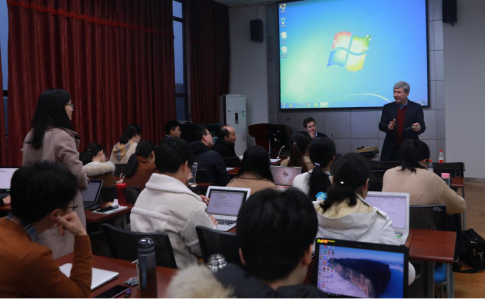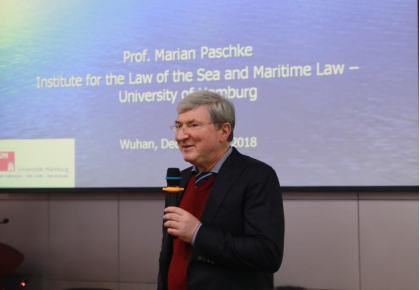On the afternoon of December 3, Professor Marian Paschke and Dr. Arne Hansen from the Law School of University of Hamburg (Universität Hamburg) visited CIBOS and held a lecture on the theme of “Marine Control and Port State Control”. Prof. Yu MinYou attended and hosted this event.

The topic of Professor Marian Paschke's speech is Ocean Governance - Balance of Economical Use and Sustainability. The development of the current marine economy has spawned a number of areas, including aquaculture, coastal and marine tourism (blue tourism), marine biotechnology (blue technology) and marine energy (blue energy), which have promoted the development of contemporary marine economy, that is, Blue Growth. Meanwhile, some misconduct in the process of marine development and utilization has brought many adverse consequences, including marine pollution, leakage of toxic substances, destruction of biodiversity and increased greenhouse effect. Therefore, Professor Marian Paschke asked this question: Is Blue Growth an opportunity or a nightmare? How should we find a balance between marine economic use and sustainable development?

Professor Marian Paschke believes that the sustainable development of the marine economy is essential, which requires a comprehensive, sustainable and balanced ocean management system. Balancing the needs of economic and the needs of social & political; meeting the needs and aspiration of present people and at the same time not jeopardizing the interests of future generations is the primary goal of achieving sustainable development of the marine economy. In particular, to give full play to the role of the United Nations Convention on the Law of the Sea(UNCLOS) as well as some relevant international treaties, all countries and governmental organizations, including citizens and social groups, should be fully responsible. For example, the German Advisory Council on Global Change (Wissenschaftlicher Beirat der Bundesregierung Globale Umweltveränderungen, WBGU) has put forward several suggestions for action on marine economic development: Firstly, using the appropriate institutional and political frameworks to build sustainable business models; second, the establishment of the "World Ocean Integrated Strategy" and the implementation of the "High Seas Biodiversity Agreement"; the third is to establish risk assessment and environmental assessment; the forth is to strengthen international cooperation between scientific units, strategic scientific cooperation between maritime law and maritime law research institutions, and strategic cooperation between scientists and scholars.

Dr. Arne Hansen's speech topic is Port state control - legal requirements and consequences. Dr. Arne Hansen firstly introduced the concept of port state control and pointed out that the purpose of establishing port state control was to prevent unqualified ships. Port state control is the second line of defense to protect the safety of the territorial sea, the marine environment and the living and working conditions of seafarers. From the legal perspective, the UNCLOS and the International Maritime Organization Convention have provisions on PSC, and a memorandum of understanding has been reached on this issue internationally. Dr. Arne Hansen emphasized that for defective ships, States have the right to detain or ban ships in accordance with relevant conventions.
On the afternoon of December 4th, Prof. Marian Paschke and Dr. Arne Hansen from the Law School of University of Hamburg, held a symposium with Dean Yu Minyou, Vice Dean Xiong Xiaoyu, and Wu Xiaoliang, Director of the Office of International Education of the School of International Education. The two sides discussed the communication and cooperation between Wuhan University and University of Hamburg, and initially drafted a draft of the student communication and cooperation agreement and work schedule, laying a foundation for further cooperation and exchange between the two universities.
(Rewritten by Xiong Shiyao)
(Edited by Fu Shanshan)
